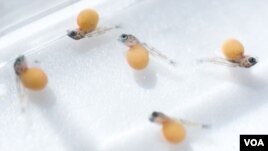01 November, 2015
Most people are born with two sets of teeth. They use baby teeth to break down food as children. As they become adults, the baby teeth are replaced with permanent or adult teeth. By age 65, 30 percent of all people worldwide have lost all their teeth.
But most bony fish can regrow their lost teeth. A team of scientists is wondering if that ability of some fish could somehow lead to human tooth regeneration, with adult men and women producing additional teeth as needed.
Fish do it all the time. Whenever they lose a tooth, a new one drops into place. Cichlids are a popular tropical fish. They keep their teeth throughout adulthood. If a tooth should fall out, another one takes its place.
Todd Streelman teaches biology at the Georgia Institute of Technology in Atlanta. He is working with cichlids to find out which genes help the fish keep their teeth.
"Our approach is to find things that are hard to study otherwise and then target them in these animals. So in this case, Lake Malawi cichlid fishes and many other fishes regenerate their dentition throughout their entire life."
As a result, a mouthful of teeth is replaced every 50 days. Professor Streelman and his team reported on their study of cichlids in the journal Proceedings of the National Academy of Sciences. They looked at embryotic cell tissue that can develop into either teeth or taste buds.

Scientists at Georgia Tech in Atlanta, USA, and Kings College in London studied 7-day-old embryonic fish to determine the pathways that differentiate teeth or taste buds. (Courtesy: Rob Felt, Georgia Tech)
"And what we found were some really interesting commonalities between teeth and taste buds at their earliest development."
Unlike humans, fish have no tongues in the mouth, so their taste buds are mixed in with their teeth.
Last year, the same researchers made a cichlid genome – a map of the fish's genes. This year, they crossed closely-related cichlids and then compared genetic differences among the second-generation fish. They found what appeared to be genetic controls that could make the embryonic cells become either a tooth or taste bud.
"We could identify this because the genes that are typically positive markers of taste buds and the genes that are typically positive markers of teeth were co-expressed. They were expressed in the same places. So we basically could watch the path through development, where this epithelial ((surface tissue)) which at one point was bi-potent ((similar tissue)) and then became either teeth or taste buds."
Teeth and taste buds begin in the same kind of tissue around the mouth of fish in their earliest stages of development. The researchers made and studied mapped cichlid genomes. They then engineered the undifferentiated tissue in fish to increase production of teeth, but cut back on taste buds. This was done at an early stage, when the fish had eyes and a brain, but were still growing jaws.
It turns out that cichlids are not the only animals that express these genes. Todd Streelman says researchers at Kings College, London, demonstrated that a few poorly studied genes in mice were also involved in the development of teeth and taste buds.
"These genes that we had identified in fishes are in fact also active in the earliest development of teeth on the jaw margin and taste buds on the tongue of mice."
Professor Streelman says the studies in fish and mice suggest that with the right signals, the tissue in humans might also be able to develop new teeth. "The direction our research is taking, at least in human health," he says, "is to figure out how to coax – work on the tissue to form one type of structure or the other."
I'm Marsha James.
VOA's Rosanne Skirble reported on this story from Washington. Marsha James adapted her report for Learning English. George Grow was the editor.
________________________________________________________________
Words in This Story
regenerate – v. to grow again after being lost
dentition – n. the arrangement or condition of the teeth in a species or individual
embryonic – adj. showing that you are sure in yourself or your actions
co-expressed – v. to express together with another gene
bi-potent – adj. having a function in a biological environment
coax – v. to work or cause something to do something